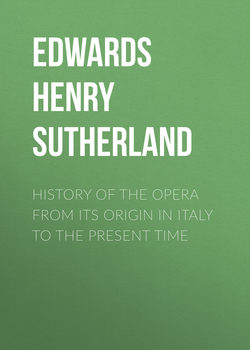History of the Opera from its Origin in Italy to the present Time

Реклама. ООО «ЛитРес», ИНН: 7719571260.
Оглавление
Edwards Henry Sutherland. History of the Opera from its Origin in Italy to the present Time
HISTORY OF THE OPERA
CHAPTER I. PREFACE, PRELUDE, PROLOGUE, INTRODUCTION, OVERTURE, ETC. – THE ORIGIN OF THE OPERA IN ITALY, AND ITS INTRODUCTION INTO GERMANY. – ITS HISTORY IN EUROPE; DIVISION OF THE SUBJECT
CHAPTER II. INTRODUCTION OF THE OPERA INTO FRANCE AND ENGLAND
CHAPTER III. ON THE NATURE OF THE OPERA, AND ITS MERITS AS COMPARED WITH OTHER FORMS OF THE DRAMA
CHAPTER IV. INTRODUCTION AND PROGRESS OF THE BALLET
CHAPTER V. INTRODUCTION OF ITALIAN OPERA INTO ENGLAND
CHAPTER VI. THE ITALIAN OPERA UNDER HANDEL
CHAPTER VII. GENERAL VIEW OF THE OPERA IN EUROPE IN THE EIGHTEENTH CENTURY UNTIL THE APPEARANCE OF GLUCK
CHAPTER VIII. FRENCH OPERA FROM LULLI TO THE DEATH OF RAMEAU
CHAPTER IX. ROUSSEAU AS A CRITIC AND AS A COMPOSER OF MUSIC
CHAPTER X. GLUCK AND PICCINNI IN PARIS
HISTORY OF THE OPERA
CHAPTER XI. THE OPERA IN ENGLAND AT THE END OF THE EIGHTEENTH AND BEGINNING OF THE NINETEENTH CENTURY
CHAPTER XII. OPERA IN FRANCE, AFTER THE DEPARTURE OF GLUCK
CHAPTER XIII. THE FRENCH OPERA BEFORE AND AFTER THE REVOLUTION
CHAPTER XIV. OPERA IN ITALY, GERMANY AND RUSSIA, DURING AND IN CONNECTION WITH THE REPUBLICAN AND NAPOLEONIC WARS. PAISIELLO, PAER, CIMAROSA, MOZART. THE MARRIAGE OF FIGARO. DON GIOVANNI
CHAPTER XV. MANNERS AND CUSTOMS AT THE LONDON OPERA, HALF A CENTURY SINCE
CHAPTER XVI. ROSSINI AND HIS PERIOD
CHAPTER XVII. OPERA IN FRANCE UNDER THE CONSULATE, EMPIRE, AND RESTORATION
CHAPTER XVIII. DONIZETTI AND BELLINI
CHAPTER XIX. ROSSINI – SPOHR – BEETHOVEN – WEBER AND HOFFMANN
Отрывок из книги
IT has often been said, and notably, by J. J. Rousseau, and after him, with characteristic exaggeration, by R. Wagner, that "Opera" does not mean so much a musical work, as a musical, poetical, and spectacular work all at once; that "Opera" in fact, is "the work," par excellence, to the production of which all the arts are necessary.1 The very titles of the earliest operas prove this notion to be incorrect. The earliest Italian plays of a mixed character, not being constructed according to the ancient rules of tragedy and comedy, were called by the general name of "Opera," the nature of the "work" being more particularly indicated by some such epithet or epithets as regia, comica, tragica, scenica, sacra, esemplare, regia ed esemplare, &c.; and in the case of a lyrical drama, the words per musica, scenica per musica, regia ed esemplare per musica, were added, or the production was styled opera musicale alone. In time the mixed plays (which were imitated from the Spanish) fell into disrepute in Italy, while the title of "Opera" was still applied to lyrical dramas, but not without "musicale," or "in musica" after it. This was sufficiently vague, but people soon found it troublesome, or thought it useless, to say opera musicale, when opera by itself conveyed, if it did not express, their meaning, and thus dramatic works in music came to be called "Operas." Algarotte's work on the Opera (translated into French, and entitled Essai sur l'Opéra) is called in the original Saggio sopra l'Opera in musica. "Opera in music" would in the present day sound like a pleonasm, but it is as well to consider the true meaning of words, when we find them not merely perverted, but in their perverted sense made the foundation of ridiculous theories.
The Opera proceeds from the sacred musical plays of the 15th century as the modern drama proceeds from the mediæval mysteries. Ménestrier, however, the Jesuit father, assigns to it a far greater antiquity, and considers the Song of Solomon to be the earliest Opera on record, founding his opinion on these words of St. Jérôme, translated from Origen: —Epithalamium, libellus, id est nuptiale carmen, in modum mihi videtur dramatis a Solomone conscriptus quem cecinit instar nubentis sponsæ.2
.....
Italian Opera was introduced into England at the beginning of the 18th century, the first work performed entirely in the Italian language being Almahide, of which the music is attributed to Buononcini, and which was produced in 1710, with Valentini, Nicolini, Margarita de l'Epine, Cassani and "Signora Isabella," in the principal parts. Previously, for about three years, it had been the custom for Italian and English vocalists to sing each in their own language. "The king,9 or hero of the play," says Addison, "generally spoke in Italian, and his slaves answered him in English; the lover frequently made his court, and gained the heart of his princess in a language which she did not understand. One would have thought it very difficult to have carried on dialogues in this manner without an interpreter between the persons that conversed together; but this was the state of the English stage for about three years.
"At length, the audience got tired of understanding half the opera, and, therefore, to ease themselves entirely of the fatigue of thinking, have so ordered it at present, that the whole opera is performed in an unknown tongue. We no longer understand the language of our own stage, insomuch, that I have often been afraid, when I have seen our Italian performers chattering in the vehemence of action, that they have been calling us names and abusing us among themselves; but I hope, since we do put such entire confidence in them, they will not talk against us before our faces, though they may do it with the same safety as if it were behind our backs. In the meantime, I cannot forbear thinking how naturally an historian who writes two or three hundred years hence, and does not know the taste of his wise forefathers, will make the following reflection: – In the beginning of the 18th century, the Italian tongue was so well understood in England, that operas were acted on the public stage in that language.
.....